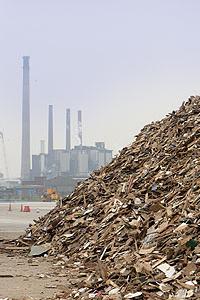Dr Alan Whitehead, MP for Southampton Test, said on Monday night that he fears proposed subsidies for renewable energy could encourage waste wood to be diverted from recycling towards use as a fuel.
Dr Whitehead was not opposed to waste wood being used to generate energy, but said only contaminated waste wood – unsuitable for being turned into furniture or animal bedding – should be used as biomass fuel.
He called on the Environment Agency to develop a protocol that could de-classify chemically-treated wood as a “waste” so that biomass plants could use the material as a fuel free from Waste Incineration Directive controls.
At the moment, there's about seven million tonnes of waste wood arising in the UK,” he explained. “Most of it currently goes to landfill, but what is being diverted tends to be the good quality wood, which has a market other than energy production. The majority of timber going to landfill is timber with some form of contamination, but there's a problem using that because of the Waste Incineration Directive.”
Dr Whitehead was speaking as he chaired Tuesday's “Biomass and Biogas: Energy from secondary resources” seminar in the House of Commons, jointly organised by the Associate Parliamentary Sustainable Resource Group and the Associate Parliamentary Renewable and Sustainable Energy Group.
He said the issue was of considerable interest to his fellow MPs currently considering the Energy Bill, which will pave the way for a revision of the ROC system to provide extra subsidies for processes like biomass energy generation. The final details of the revised ROC subsidies are likely to be subject to secondary legislation made after the Energy Bill is agreed by Parliament.
“The concern at the very least is if you get one ROC and possibly even two ROCs for clean biomass you can get a lot more money for energy than for making it into products,” he warned.
“This raises the question as to whether ROCs incentivise or merely transfer waste wood into energy production.”
Protocol
The Environment Agency decided last year not to develop a quality protocol for waste wood, after initial work looking into the possibility suggested it would prove too difficult (see letsrecycle.com story).
The Agency is developing protocols for other recovered materials, which would see them legally classified as a “product” rather than a “waste”.
This would mean companies buying, selling or handling them would not have to have a waste management licence or exemption, and would be freed from other waste controls such as the Waste Incineration Directive, which imposes strict limits on emissions from the combustion of any waste material. A wood protocol would allow waste wood unsuitable for recycling to be used in energy production, Dr Whitehead believes, rather than quality waste wood.
Dr Whitehead said on Monday: “We have not got an Environment Agency-agreed protocol for contaminated wood as to when it becomes a resource and when it must conform to the Waste Incineration Directive – and this raises a question mark as to this whole area. There remains a tremendous resource in wood currently going to landfill.”
The wood recycling industry, through the Wood Recyclers Association, is now working to develop a protocol themselves, with the hope of gaining official recognition of waste wood that has “acceptable” contamination levels (see letsrecycle.com story).












Subscribe for free